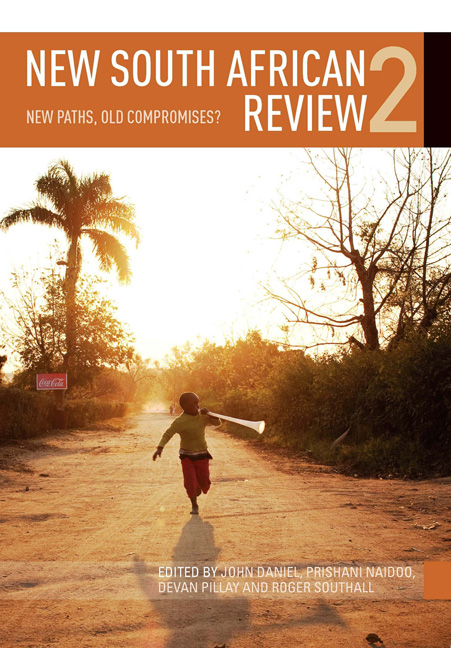Book contents
- Frontmatter
- Contents
- Preface
- Introduction: New paths, old (com)promises?
- PART 1 POLITICS AND INTERNATIONAL
- PART 2 ECONOMY AND SOCIETY
- PART 3 ENVIRONMENT
- Introduction: Ecological threats and the crisis of civilisation
- Chapter 14 Above and beyond South Africa's minerals-energy complex
- Chapter 15 Corrosion and externalities: The socio-economic impacts of acid mine drainage on the Witwatersrand
- Chapter 16 Food versus fuel? State, business, civil society and the bio-fuels debate in South Africa, 2003 to 2010
- PART 4 MEDIA
- Contributors
- Index
Chapter 16 - Food versus fuel? State, business, civil society and the bio-fuels debate in South Africa, 2003 to 2010
from PART 3 - ENVIRONMENT
Published online by Cambridge University Press: 23 March 2018
- Frontmatter
- Contents
- Preface
- Introduction: New paths, old (com)promises?
- PART 1 POLITICS AND INTERNATIONAL
- PART 2 ECONOMY AND SOCIETY
- PART 3 ENVIRONMENT
- Introduction: Ecological threats and the crisis of civilisation
- Chapter 14 Above and beyond South Africa's minerals-energy complex
- Chapter 15 Corrosion and externalities: The socio-economic impacts of acid mine drainage on the Witwatersrand
- Chapter 16 Food versus fuel? State, business, civil society and the bio-fuels debate in South Africa, 2003 to 2010
- PART 4 MEDIA
- Contributors
- Index
Summary
INTRODUCTION
Bio-fuels have been hailed as a potential panacea for a host of pressing issues including climate change, energy security and rural development. In recent years, however, initiatives aimed at increasing the production and utilisation of bio-fuels have faced harsh criticism from many quarters, including multilateral agencies and human rights groups from around the world. They argue that the production of bio-fuels diverts land and resources away from vital food production, ultimately contributing to global food price inflation. This has become known in the literature and in the news media as the ‘food versus fuel debate’. The chapter explores how the food versus fuel debate played out within the context of the post-apartheid South African political economy and examines how opposing interest groups sought to influence the state's policy towards this controversial source of renewable energy. For (mainly white) commercial farmers and their counterparts in the nascent bio-fuels processing sector, the prospect of a supportive incentives regime for the industry was very attractive because it promised to revive the fortunes of a sector in decline by creating additional markets for agricultural produce, especially maize. The Mbeki administration at first appeared to support their position and singled out bio-fuels production as a key pillar of his new targeted economic growth strategy, the Accelerated and Shared Growth Initiative for South Africa (AsgiSA). However, under pressure from civil society groups and, perhaps more significantly, the ruling ANC's main political ally, the Congress of South African Trade Unions (Cosatu), this support proved to be short-lived.
Criticisms levelled by these groups varied widely and were not limited to discussions about the relationship between bio-fuels production and rising food prices (which, given South Africa's regular maize surpluses, was an economic relationship that was not entirely clear). Submissions received during the public consultation process also included, for instance, concerns for the negative health implications of an increased distribution of genetically modified (GM) seeds, concerns about the retreat of rural communities’ diverse ‘natural farming methods’ and criticisms regarding the overall economic rationale underlying AsgiSA itself.
- Type
- Chapter
- Information
- New South African Review 2New paths, old compromises?, pp. 321 - 340Publisher: Wits University PressPrint publication year: 2012



